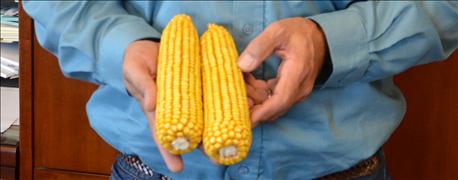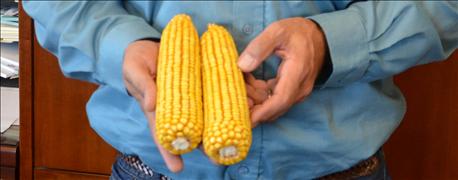
Beck’s, a regional seed company, issued a news release recently claiming that it could offer the most diverse genetic and trait offering in the industry. That kind of claim catches attention, and also raises eyebrows.
Indiana Prairie Farmer sat down with Kevin Cavanaugh, director of research, at Beck’s headquarters in Atlanta, Ind.
“We believe that the claim is accurate,” Cavanaugh says. “We can offer our customers the most diversity in genetic and trait choices compared to anyone else in the industry.”
Here are the different components that back the claim, Cavanaugh says.

BREEDING PROGRAMS PART OF MIX: Proprietary breeding programs provide part of the genetic diversity that Beck’s says it offers to customers.
Strong relationship with Monsanto. Monsanto is one of the leading developers of GMO traits. “We have developed a relationship with Monsanto that goes beyond just being a licensee,” Cavanaugh says. “It allows us to access traits which the company has that make sense for our customers.”
Access to DuPont Pioneer genetics. Pioneer originally began marketing genetics to regional companies several years ago. Each company sells hybrids that it obtains from Pioneer through this program under an exclusive name. The products are sold and distributed in a bag with a different color scheme than the company’s other offerings.
Pioneer has since bought all but two of those companies: Beck’s and Burrus Seed in Illinois, Cavanaugh says.
“We are the only company that has an exclusive crossing agreement with Pioneer to take any inbred from Pioneer and cross it with an inbred developed in our own breeding program,” Cavanaugh says. “We don’t have rights to breed with their material. What we have is crossing rights to use one of their inbreds and one of our inbreds to make a hybrid.”
This adds to the diversity because no one else has this type of agreement with Pioneer, he explains.
Full rights to GreenLeaf germplasm. Beck’s also has access to inbreds offered by GreenLeaf Genetics, the licensing arm of Syngenta. Essentially, this gives Beck’s the opportunity to offer genetics from Syngenta’s breeding program. Syngenta has been aggressive in developing some of the newer, more effective insect-resistance traits. Beck’s can access those, as well.
Access to Dow AgroSciences genetics. Beck’s also can access Dow AgroSciences’ germplasm through agreements with that company, Cavanaugh says. This also gives Beck’s access to GMO traits Dow AgroSciences develops.
In-house breeding programs. Perhaps the biggest key for the future is that Beck’s has its own breeding program, Cavanaugh says. To be accurate, the company has five breeding programs underway for corn. It does not have a breeding program for soybeans at this time.
“We have five corn breeders, and each one of them is working independently on their own breeding program,” he says. “The trend used to be to locate a breeder at a station, and let him or her develop a breeding program. We have three breeders here and two in Iowa. There is synergy in having them together, even though they work independently. It also gives them access to molecular marker labs and other tools which are at a central location.”
Beck’s is one of only seven companies with actual corn breeding programs in the U.S. Currently, more than 10% of Beck’s sales traces back to its own in-house breeding programs.
About the Author(s)
You May Also Like




